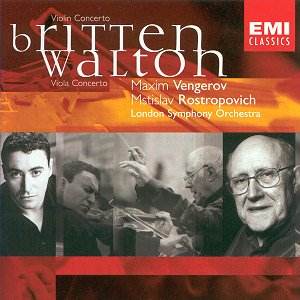Until very recently, Britten’s violin concerto
had proved elusive in the ideal studio performance. Lydia Mordkovich
on Chandos was the first to give it a glowing performance and
now Maxim Vengerov, the finest violinist of the last decade, has
turned to the work that he played in London last year under these
same partners, Rostropovich and the London Symphony Orchestra.
The result is a superlative performance of a
concerto that hasn’t really been taken up by top-flight violinists
(Heifetz, Menuhin and Perlman, for example, no strangers to ‘English’
concertos, studiously avoided it). It is certainly a work of contrasts:
technically, it is ruthlessly difficult, idiomatically it is much
less ‘English’ than virtually any violin concerto by a British
composer that precedes it. Moments of lyricism are accompanied
by moments of barrenness, but what perhaps makes it so difficult
to bring off is its stark intellectualism and the conflict between
major and minor which gives the work an unsettled persona of equivocation.
As Vengerov said before his concert performances
last year: "It is a very special work. Britten uses colouring
that hadn't really been used before, both harmonically and by
his intriguing combinations of the instruments. I think that the
real challenge is not in the technique but in the interpretation;
Britten's musical ideas can be very intense and so to communicate
them clearly to the audience you have to work very hard as a performer.
But because of this it is very rewarding to play, and I think
to listen to."
In part, Britten’s concerto may have suffered
because in design it is similar to Prokofiev’s First Concerto,
composed almost 20 years earlier. An undeniably greater work,
Prokofiev’s highlights what the Britten concerto lacks: a searing
melodic line allied with a complex of austerity and emotion. Britten
may also have been tempting fate by making the opening drum rhythm
so close to that employed in Beethoven’s concerto, even if in
Britten’s case the drums are more stifled to prevent the comparison
being an obvious one. It is often the case that indifferent performances
of this work are responding to Britten’s own lack of inventiveness.
What Vengerov brings to this performance, however,
is not just a brilliant technique (as an example of virtuoso playing
it could not be bettered), but a deeper understanding of the work’s
colours, something not naturally evoked in other recorded interpretations
of the work. The Spanish rhythms of the first movement are inflected
with glittering flamenco touches ideally suited to Vengerov’s
magical lightness of tone, and the Passacaglia bears all the hallmarks
of Vengerov’s way with Bach – taut and incisive. More than that,
he invests the concerto with an individuality of descriptiveness
and gives a haunting ambivalence to much of the work’s darker
undertones. Rarely, if ever, has this work sounded so threatening
and disturbing as it does on this recording.
Rostropovich brings an innateness of idiom to
his conducting, and perhaps more than any other conductor makes
the work as sombre and dark as it was intended to be (much in
keeping with Rostropovich’s approach to Shostakovich in fact).
And unusually for this conductor, his rapport with his soloist
is absolute.
Walton’s Viola Concerto has been recorded by
violinists before – Menuhin and Kennedy both recorded it, although
neither performance is satisfactory when compared with performances
by Bashmet and Primrose. Deemed impossible to play when it was
first written, ten years before the Britten concerto, Vengerov
(playing the 1961 version) negotiates its technical hurdles with
ease (superb double-stopping is especially noticeable in the first
and last movements). However the work’s ripe romanticism doesn’t
always suit Vengerov who tends nowadays to shun wide vibrato.
He is certainly able to produce opulent tone when needed, especially
in the opening movement taken at a very broad tempo, but that
is achieved more by the perfection of his intonation than by any
need to broaden the sound of the viola.
His performance of the scherzo is mercurial –
almost anarchic in its virtuosity – but what is striking are the
jazz syncopations that come so naturally to Vengerov. In no other
performance of this work is the brilliance of Walton’s writing
delivered with such panache and such feeling for rhythm as it
is here, and in no other performance are the scherzando passages
delivered with such velocity and accuracy of touch. It is spellbinding.
Some of Vengerov’s (and the London Symphony Orchestra’s)
best playing is reserved for the massive final movement where
Vengerov’s eloquence on the instrument is demonstrated to its
full potential. Listen to him at 12 minutes into the final movement
and the most glorious pianissimo playing evokes a mistral
of haunted beauty that is breathtaking. The close of the work,
hushed and intense in equilibrium, is delivered with sanctifying
introspection. Rostropovich and the LSO match their outstanding
soloist in every bar.
EMI’s slightly recessed recording – beautifully
balanced though it is – needs to be played back at a high volume
but the sound is extremely well focussed. It complements an outstanding
disc that gives us the best recording yet of Britten’s concerto
and a performance of the Walton that is only bettered by William
Primrose’s second recording.
Marc Bridle
See also review by
Ian Lace

